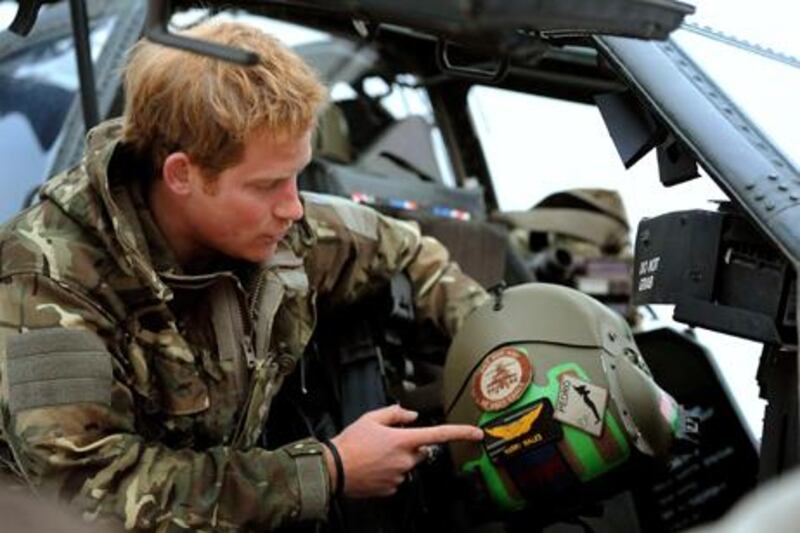LONDON // The Taliban yesterday accused Prince Harry of having "developed a mental problem" after he compared the shooting of insurgents to playing video games.
Harry, third in line to the British throne, said he had killed Taliban insurgents during his 28 weeks as an Apache helicopter co-pilot gunner in Afghanistan, his second stint in the country.
As co-pilot, Prince Harry was in charge of the weapons systems in a two-man cockpit, firing Hellfire air-to-surface missiles, rockets and a 30-millimetre gun. "It's a joy for me because I'm one of those people who loves playing PlayStation and Xbox, so with my thumbs I like to think I'm probably quite useful," he said in interviews released on Monday after the end of his posting.
Taliban spokesman Zabiullah Mujahid was far from impressed with the prince's remarks.
"There are 49 countries with their powerful military failing in the fight against the mujahideen, and now this prince comes and compares this war with his games, PlayStation or whatever he calls it," MrMujahid said.
"This is a serious war, a historic war, resistance for us, for our people. But we don't take his comments very seriously, as we have all seen and heard that many foreign soldiers, occupiers who come to Afghanistan, develop some kind of mental problems on their way out."
Known in the army as Prince Wales - his official title is Prince Henry of Wales - Harry gave the interviews over a period of time at Camp Bastion, the main British military base in Afghanistan, where he was also filmed playing computer games with other soldiers and eating in the mess tent.
The prince had harsh words for the British press with which he has had several run-ins. Just before he left for his tour in Afghanistan, photographs emerged of him cavorting naked in a Las Vegas hotel room with an unidentified woman.
"I probably let myself down, I let my family down, I let other people down," Prince Harry said of the episode. "But at the end of the day I was in a private area and there should be a certain amount of privacy that one should expect … The papers knew that I was going out to Afghanistan anyway, so the way I was treated from them I don't think is acceptable."
He also suggested he was more comfortable in the army than in his role as a member of the British royal family.
"It's very easy to forget about who I am when I am in the army. Everyone's wearing the same uniform and doing the same kind of thing. I get on well with the lads and I enjoy my job. It really is as simple as that."
The prince did not share his opinions about the war itself, even if his presence did not go unnoticed in the strife-torn country.
Earlier this year, Gulbuddin Hekmatyar, a former prime minister who leads Afghanistan's second largest armed group, Hezb-I-Islami, condemned Britain as an American lackey for participating in the invasion. He singled out Prince Harry, according to Britain's Daily Telegraph newspaper, as a "jackal" that came to the country to "kill innocent Afghans while he is drunk".
Britain is reducing its troop presence in Afghanistan by 3,800 before the end of this year along with Nato plans to withdraw all combat troops by the end of 2014.
Prince Harry said the conflict had changed from his earlier deployment in 2009 with less contact with enemy fighters and a greater focus on training Afghan troops.
"Yes we fire when we have to but essentially we're more of a deterrent than anything else," he said. "If guys get injured, we come straight into the overhead [position], box off any possibility of an insurgent attack because they look at us and just go, 'Right, that's an unfair fight, we're not going to go near them'.
* With additional reports from Agence France-Presse





